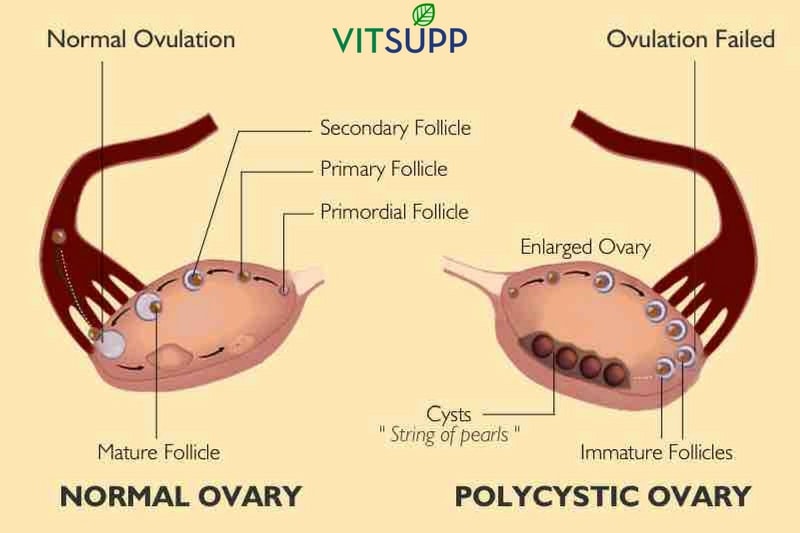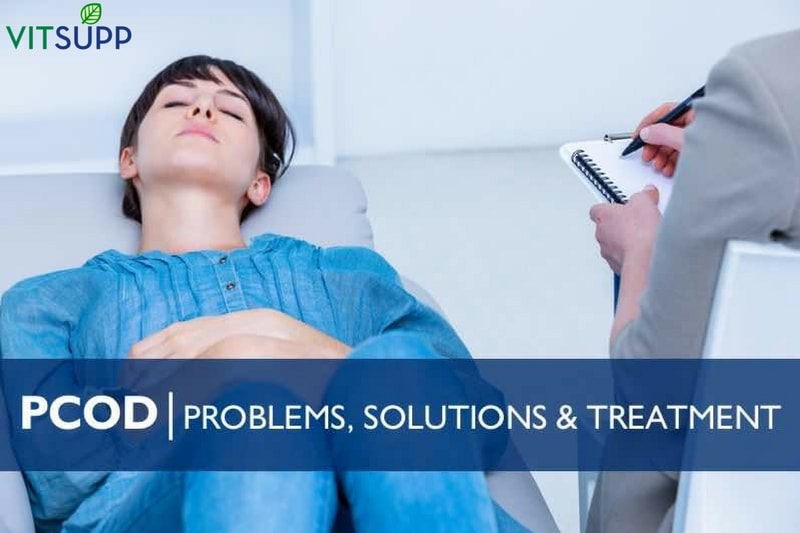PCOD (polycystic ovarian disease) is the most common reproductive endocrine disorder which can lead to infertility in women. The principle cause of PCOD problem is imbalance in women sex hormones which in turn disrupts ovulation and hence results in subfertility.
PCOS affects between 8% and 20% of reproductive-age women worldwide.(1)
Most women are diagnosed during their twenties or thirties, but PCOS may affect girls as young as 11 who haven’t even had their first period.(2)
An Indian study conducted by the department of endocrinology and metabolism, AIIMS, shows that about 20-25 per cent of Indian women of childbearing age are suffering from PCOS.
While 60 per cent of women with PCOS are obese, 35-50 per cent have a fatty liver. About 70 per cent have insulin resistance, 60-70 per cent have high level of androgen and 40-60 per cent have glucose intolerance. (3)

We asked Daniel Boyer, MD at Farr Institute, to explain the difference between PCOS and PCOD. He said, “PCOS is an endocrine disorder in women that occurs when ovaries release a high male hormone that makes them larger. PCOD: A condition in the ovaries caused by hormonal imbalances that make ovaries release eggs prematurely that turn into cysts later.”
Contents
What is PCOD problem in females
Ovaries are responsible for producing the women’s sex hormones – oestrogen and progesterone. They also produce some amount of male sex hormones i.e. testosterone (androgens).
Polycystic ovarian disease (PCOD) is a result of an imbalance in these sex hormones.
In PCOD, ovaries make slightly more androgens which in turn inhibits ovulation and increases the risk of subfertility in such women.

In healthy women, one egg grows and become dominant each month which ovulate and when fertilized with the sperm, results in pregnancy. However, in PCOD women, there are multiple follicles in the ovary but none of them mature to become dominant follicle.
Hence, regular ovulation that occurs every month in normal healthy women, does not occur in women with PCOD problem. This anovulation results in subfertility.
Multiple follicles of 2-8mm in size (>12 follicles in each ovary) give rise to string of pearl appearance on ultrasound.
Not only this, women with PCOD have a higher risk of developing other chronic health conditions like hypertension, diabetes, high cholesterol, anxiety, depression, sleep apnea, heart attack, endometrial, ovarian and breast cancer.
Women who have PCOD have a higher rate of miscarriage, gestational diabetes, and premature delivery.
What is PCOD?
Poly-cystic ovarian disease (PCOD) as the name suggests- there are many (Poly) follicles (fluid filled sac) formed in the ovaries. This usually happens due to hormonal imbalance.
A healthy ovary produces women sex hormones and a small amount of male hormones (androgen).
The other name for PCOD or PCOS (Poly cystic ovarian syndrome) is Stein-Leventhal syndrome.

Kire Stojkovski, a practicing medical doctor at Farr Institute, explained to us what is PCOD, “Polycystic Ovarian Syndrome (PCOD) is a hormonal disorder that causes the ovaries in a woman to enlarge and also forms a cyst in the outer parts of the ovaries.”
PCOD Problem
It is a disorder which causes subfertility among women. PCOD usually occurs when normal menstrual cycles are disrupted. As regular ovulation occurring every month does not occur in PCOD women, theses women face difficulty in conceiving spontaneously.
In India alone more than 18% women are affected by polycystic ovarian disease.
PCOD is a set of symptoms that result from a hormonal imbalance affecting women and girls of childbearing age.
Women with PCOD usually have at least two of the following three conditions:
- Absence of ovulation, leading to irregular menstrual periods or no periods at all
- High levels of androgens (a type of hormone) or signs of high androgens, such as having excess body or facial hair
- Multiple small follicles ranging from 2-9 mm( > 12follicles in each ovary) in one or both ovaries
Some women diagnosed with PCOD have the first two conditions listed above as well as other symptoms of PCOD but do not have cysts on their ovaries.
Who is at risk for PCOD?
Women are at higher risk for PCOD if they:
- Have a mother or sister with PCOD
- Are obese
PCOD symptoms
Here are the common symptoms that may be a soft signal for women with PCOS. Most symptoms begin shortly after puberty but they can also develop during the late teens and into early adulthood.:
- Acne and excess hair growth (due high level of androgens, the male hormone). Often women get thick hair on face. This is quite visible hair on chest, belly, and back too.
- Consistent weight gain and trouble losing it. A study conducted by the department of endocrinology and metabolism, AIIMS, has shown that about 60 per cent of women with PCOD are obese. (4, 5, 6)
- Thinning of the hair on the scalp
- Women with PCOD typically have irregular menstrual cycles or amenorrhea. They often have fewer than nine periods per year. Some women may have no periods at all. While others may have very heavy bleeding.
- Fertility problems. Many women with PCOD have trouble getting pregnant.
- Polycystic ovaries
- History of ovarian cysts. Women are likely to develop PCOD if their mother or sister also has the condition.
- Elevated blood pressure level
- Mood disorders
- Recurrent Miscarriage
It is not necessary that woman suffering from PCOD will exhibit all or any of these symptoms. But, these are the most common and classic symptoms that hints something wrong with the ovaries.
Strangely, polycystic ovaries are also seen in 20% (approximately) of women with normal menstrual cycles.

We wanted to know what an expert says on the symptoms of PCOD. Kire Stojkovski, a practicing medical doctor at Farr Institute, explained, “Symptoms of PCOD include monthly periods that last longer than normal. Also, a female looking more masculine than feminine can be a sign of PCOD. This is due to excess male hormones in a woman.”
PCOD problem and pregnancy
As we know eggs mature in the sacs (also called follicles) within ovaries and are released during the menstrual cycle.
If a woman has PCOD, the eggs do not mature and are not released from ovaries. Instead, they may turn into small cysts causing enlarged ovaries.
Due to the lack of mature eggs women suffer anovulation (absence of ovulation) making them prone to infertility.
While some women with PCOD will have all the classic symptoms and signs, many have what we call “occult PCOD”. This is a strange scenario where some patients with PCOS do not show any of the classic symptoms.
They appear slim, have regular menstrual cycle, visually normal ovaries (on ultrasound), and no hirsutism but still have PCOD.
Such patients may face super-ovulation where they produce large number of follicles. Many of them suffer from recurrent pregnancy loss (recurrent miscarriages).
PCOD Test
Initially a blood test is performed to check the level of female (LH/FSH) and male hormones (testosterone). Ultra sound is also carried out to check the appearance of the ovaries, number of follicles in the ovaries and thickness of the lining of the uterus.
To rule out the other conditions that generate PCOS like symptoms below tests may also be recommended by the doctors: Thyroid Stimulating Hormone (TSH), Prolactin, 17-hydroxyprogesterone (hormones related to adrenal function)
Pcod Problem Solution: How to Cure PCOD

We asked Daniel Boyer, the MD at Farr Institute, to give us his insights into controlling PCOD. He said, “A healthy lifestyle may help control this condition. These changes may include regular exercise lowers blood which ensures that the body makes enough insulin hormone, reduces weight as it improves your condition and also makes your medications more effective, and a diet low in carbohydrates that ensure low blood sugar levels.”
Barring few exceptional cases, the treatment of PCOD is not as difficult as it may seem. One can opt for any of the below mentioned PCOD solutions:
Natural PCOD Problem Treatment
Wonder how to cure PCOD problem naturally? Well, there is no such thing as a cure, but the condition can be corrected or reversed to quite an extent with diet and lifestyle changes.
It usually takes 6 months of persistent life style & diet changes to see the benefits. The result varies from person to person.
Life style modification
Up to 5-10 per cent of weight loss (~ 4 to 7 Kgs) will help improve the hormonal balance and regularization of the menstrual cycle. Regular exercise with healthy diet helps in weight reduction.
PCOD among women, especially adolescents, is becoming an urgent public health problem that needs timely intervention and appropriate treatment.
Pcod Diet
Women with Pcos often have high level of insulin which in turn causes the ovaries to produce more androgens. Hence, a diet high in refined carbohydrates (sugary and starchy food) should be avoided.
Avoid junk and processed food and add whole foods in your diet.
Stick to a diet that contains 95 percent whole foods including vegetables, nuts, lentils and leafy greens.
Consume fibre and iron rich foods such as broccoli, cauliflower, Brussels sprouts, spinach, etc.
Many people who overcame PCOS also claim to have benefitted from Apple Cider Vinegar as part of their routine diet.
Medicines
Ovulation inducing drugs are available which should be taken under the supervision of infertility experts, these drugs help in achieving ovulation and also helps in regularizing their menstrual cycle.
Insulin sensitizing drugs are also available which increase the sensitivity of peripheral tissue to insulin and thus decreasing insulin level in body which further results in lowering down the testesterone (male hormone) level in body.
These drugs either alone or in combination with ovulation inducing drugs help in achieving ovulation.
FAQs
PCOD, or polycystic ovarian disease, is a condition that affects a woman’s ovaries. The ovaries are responsible for producing eggs, and in women with PCOD, they develop cysts (fluid-filled sacs) that prevent the eggs from being released. This can cause irregular periods, fertility problems, and other symptoms. Here’s good news, there are treatments available by which you can manage the symptoms and improve your quality of life.
Polycystic ovarian syndrome (PCOS) is a hormonal disorder that affects women of childbearing age. It is characterized by multiple cysts in the ovaries and high androgens (male hormones) levels in the body. PCOS can show various symptoms, including irregular periods, acne, excess hair growth, and weight gain. You can manage PCOS with lifestyle changes and medication.
A variety of symptoms can be associated with PCOD, and they can vary from woman to woman. The common symptom is irregular menstrual periods, which can occur infrequently or not at all. Other common symptoms include obesity, excess hair growth on the face and body, acne, and fertility problems. In some cases, women with PCOD may also experience anxiety and depression. Treatment for PCOD will vary depending on the condition’s severity and the present symptoms. Medication may sometimes be necessary to regulate hormones and help with weight loss. You can go for surgery in severe cases. Most women with PCOD can live normal, healthy lives with proper treatment.
We can offer no simple answer to this question as it depends on some factors. If you have PCOD and are hoping to become pregnant, you must speak with your doctor about your best course of action. In some cases, fertility treatments may be necessary in order to conceive, while in others, lifestyle changes may be all that is needed. PCOD can make becoming pregnant more difficult, but it is not necessarily a barrier to pregnancy. With the right treatment and support, many women with PCOD can have healthy pregnancies and babies.
There are many ways that you can cure your PCOD problem at home. Some of the most popular methods include:
1. Making dietary changes: One of the best ways to cure your PCOD is by making simple dietary changes. Quit eating processed and sugary foods and instead focus on eating fresh fruits, vegetables, and whole grains. You should also ensure plenty of protein to help regulate your hormone levels.
2. Getting regular exercise: Exercise is another great way to cure your PCOD. Not only will it help to regulate your hormone levels, but it will also help to improve your overall health.
3. Reducing stress: Stress can majorly trigger PCOD flare-ups. Therefore, find ways to reduce your stress levels. Some great ways to do this include yoga, meditation, and aromatherapy.
4. Taking supplements: Several different supplements can help treat PCOD. These include fish oil, vitamin B6, and saw palmetto.
5. Using natural therapies: Some different natural therapies can help treat PCOD. These include acupuncture, herbs, and homeopathy.
If you are struggling with PCOD, it is important to remember that you are not alone. Many other women are dealing with this condition. However, by making some simple lifestyle changes and using natural therapies, you can cure your PCOD problem at home.
Yes, a person can have PCOD even if they have regular periods. This is because PCOD is not necessarily determined by the frequency of one’s periods. Rather, it is characterized by cysts on the ovaries, which can cause irregularity in a person’s menstrual cycle. However, not all women with PCOD will have regular periods. Some may experience infrequent or irregular periods, while others may stop having them altogether. PCOD can cause several other symptoms, such as weight gain, fatigue, and fertility issues. If you think you might have PCOD, you must see a doctor for diagnosis and treatment.
The best way to lose weight in PCOD will vary from person to person. However, certain general tips and advice can help women with PCOD lose weight successfully.
Firstly, it is important to understand that losing weight in PCOD requires a slow and steady approach. Crash or fad diets are not the answer as they can worsen the condition. Instead, a healthy and sustainable diet plan should be followed to lose weight safely and effectively.
Of course, a few specific dietary changes that can be helpful for women with PCOD who want to lose weight. Firstly, it is important to increase the intake of fiber-rich foods, as this can help to regulate the metabolism and aid in weight loss. Foods such as whole grains, fruits, vegetables, and legumes are all good sources of dietary fiber.
In addition, it is also necessary to reduce the intake of simple carbohydrates such as sugar and white flour. These types of carbohydrates can cause blood sugar levels to spike, which can exacerbate PCOD symptoms. Oats and brown rice are a much better option.
Finally, ensuring you are drinking plenty of water is also important. Water can reduce water retention and flushes out toxins from your body, which can be a problem for women with PCOD. Go for at least eight glasses of water per day.
References:
- Epidemiology, diagnosis, and management of polycystic ovary syndrome. NCBI
- Polycystic Ovary Syndrome (PCOS). NCBI
- Perspectives of reproductive health research by The Indian Society for the study of Reproduction & Fertility. ResearchGate
- 1 in 4 Indian women suffers from ovarian cysts: AIIMS. AsianAge
- Women suffering from PCOD are vulnerable to type 2 diabetes. IndiaTimes
- A cross-sectional study of polycystic ovarian syndrome among adolescent and young girls in Mumbai, India. NCBI
- 1 In 5 Women Affected By PCOS In India! But Fret Not, We Have The Solution. IndiaTimes



PCOD is the main causes of Infertility so every infertility couples need to know about causes of infertility and its treatment.
thanks for sharing Valuable information keep sharing blog like this.
Thanks for Sharing Valuable information keep sharing blog like this
Ins Team pcod